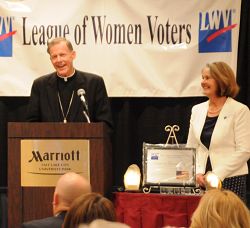During luncheon, Archbishop Wester shares his personal reflections on immigration
Friday, May. 08, 2015

Intermountain Catholic
+ Enlarge
Archbishop John C. Wester answers questions after his keynote address at the League of Women Voters' State of the Community luncheon on April 28; also shown is Susan Lind, chairperson of the luncheon committee. IC photo/Marie Mischel
SALT LAKE CITY — Since 2008, when The Most Rev. John C. Wester, administrator of the Diocese of Salt Lake City and Archbishop-elect of Santa Fe, was elected chairman of the United States Conference of Catholic Bishops’ Committee on Migration, he has traveled throughout the country and the world, meeting with immigrants to hear their stories. He also has been an outspoken proponent for the need for comprehensive immigration reform in the U.S.
On April 28, he shared his personal thoughts about the topic as the keynote speaker at the League of Women Voters’ State of the Community luncheon.
During her introduction of the archbishop, Susan Lind, chairperson of the luncheon committee, pointed out that the archbishop also “has been a strong supporter of expanding Medicaid and other issues of great concern here in Utah” and “has celebrated the multicultural makeup of the Church in Utah and has emphasized service to undocumented immigrants and the poor as well as ecumenical outreach to the state’s predominant faith and other religious groups.”
Acknowledging that immigration is a difficult topic to talk about, Archbishop Wester said, “I’ve spoken throughout the country on this theme, only to come home to Salt Lake City to sometimes literally hundreds of emails from my brothers and sisters in the Catholic Church inviting me to basically leave the Catholic Church.”
Nevertheless, he said, “One thing I’ve discovered is that on both sides of the aisle, in our talks here in the state of Utah and in Washington, D.C., everybody agrees that we do need to do something; it’s just what do we do and how do we do it?”
Rather than discuss the research and statistics on immigration, Archbishop Wester chose to share his personal thoughts on the matter, because “I think all of us need to really reflect on why we advocate for what we advocate for,” he said, adding that this type of introspection also allows people to treat each other with respect.
For example, the border between Mexico and the U.S. has more than 700 miles of fences, but he has asked himself what fences he has built in his own life, and wondered how he lets people in or keeps them out.
He asked similar questions about how other immigration issues such as family unity, unfair labor practices and human trafficking might find traces in his own treatment of others.
On the matter of intolerance, for instance, he pointed out that words are powerful, and describing immigrants as “tsunamis or insects or waves of pestilence crossing our borders” detracts from the fact that these men, women and children are human beings often fleeing death and crushing poverty in their home countries.
He then questioned whether he himself uses respectful language with others. “Do I put people down, even subtly, by the words that I use in describing them, perhaps even subtly ridiculing them?” he asked.
In conclusion, he suggested that people need to see themselves as fellow travelers on a journey who need to support one another “or else we’re not going to get there.” Applying this attitude to the immigration debate will lead to people working together instead of being divided, he said.
Immigration reform “has to begin with me,” the archbishop added. “I believe this is something that Pope Francis has been talking about to us and to whoever will listen. We must look at these things personally and be engaged. It’s not enough just to allow things to happen in our society and in our country and in our world without engaging and without realizing ‘I have a responsibility to start with myself.’”
For questions, comments or to report inaccuracies on the website, please CLICK HERE.
© Copyright 2024 The Diocese of Salt Lake City. All rights reserved.
© Copyright 2024 The Diocese of Salt Lake City. All rights reserved.

Stay Connected With Us